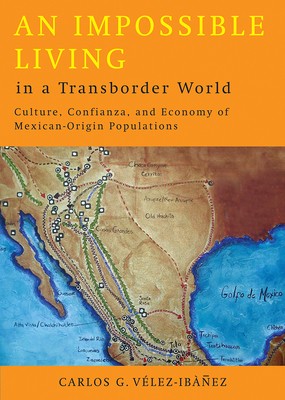
- We will send in 10–14 business days.
- Author: Carlos G Vélez-Ibáñez
- Publisher: University of Arizona Press
- ISBN-10: 0816526354
- ISBN-13: 9780816526352
- Format: 22.6 x 15.2 x 1.8 cm, softcover
- Language: English
- SAVE -10% with code: EXTRA
An Impossible Living in a Transborder World (e-book) (used book) | bookbook.eu
Reviews
Description
They are known as cundinas or tandas in Mexico, and for many people these local savings-and-loan operations play an indispensable role in the struggle to succeed in today's transborder economy. With this extensively researched book, Carlos Vélez-Ibáñez updates and expands upon his major 1983 study of rotating savings and credit associations (ROSCAs), incorporating new data that reflect the explosion of Mexican-origin populations in the United States. Much more than a study of one economic phenomenon though, the book examines the way in which these practices are part of greater transnational economies and how these populations engage in-and suffer through-the twenty-first century global economy.
Central to the ROSCA is the cultural concept of mutual trust, or confianza. This is the cultural glue that holds the reciprocal relationship together. As Vélez-Ibáñez explains, confianza "shapes the expectations for relationships within broad networks of interpersonal links, in which intimacies, favors, goods, services, emotion, power, or information are exchanged." In a border region where migration, class movement, economic changes, and institutional inaccessibility produce a great deal of uncertainty, Mexican-origin populations rely on confianza and ROSCAs to maintain a sense of security in daily life. How do transborder people adapt these common practices to meet the demands of a global economy? That is precisely what Vélez-Ibáñez investigates.EXTRA 10 % discount with code: EXTRA
The promotion ends in 20d.02:41:49
The discount code is valid when purchasing from 10 €. Discounts do not stack.
- Author: Carlos G Vélez-Ibáñez
- Publisher: University of Arizona Press
- ISBN-10: 0816526354
- ISBN-13: 9780816526352
- Format: 22.6 x 15.2 x 1.8 cm, softcover
- Language: English English
They are known as cundinas or tandas in Mexico, and for many people these local savings-and-loan operations play an indispensable role in the struggle to succeed in today's transborder economy. With this extensively researched book, Carlos Vélez-Ibáñez updates and expands upon his major 1983 study of rotating savings and credit associations (ROSCAs), incorporating new data that reflect the explosion of Mexican-origin populations in the United States. Much more than a study of one economic phenomenon though, the book examines the way in which these practices are part of greater transnational economies and how these populations engage in-and suffer through-the twenty-first century global economy.
Central to the ROSCA is the cultural concept of mutual trust, or confianza. This is the cultural glue that holds the reciprocal relationship together. As Vélez-Ibáñez explains, confianza "shapes the expectations for relationships within broad networks of interpersonal links, in which intimacies, favors, goods, services, emotion, power, or information are exchanged." In a border region where migration, class movement, economic changes, and institutional inaccessibility produce a great deal of uncertainty, Mexican-origin populations rely on confianza and ROSCAs to maintain a sense of security in daily life. How do transborder people adapt these common practices to meet the demands of a global economy? That is precisely what Vélez-Ibáñez investigates.

Reviews